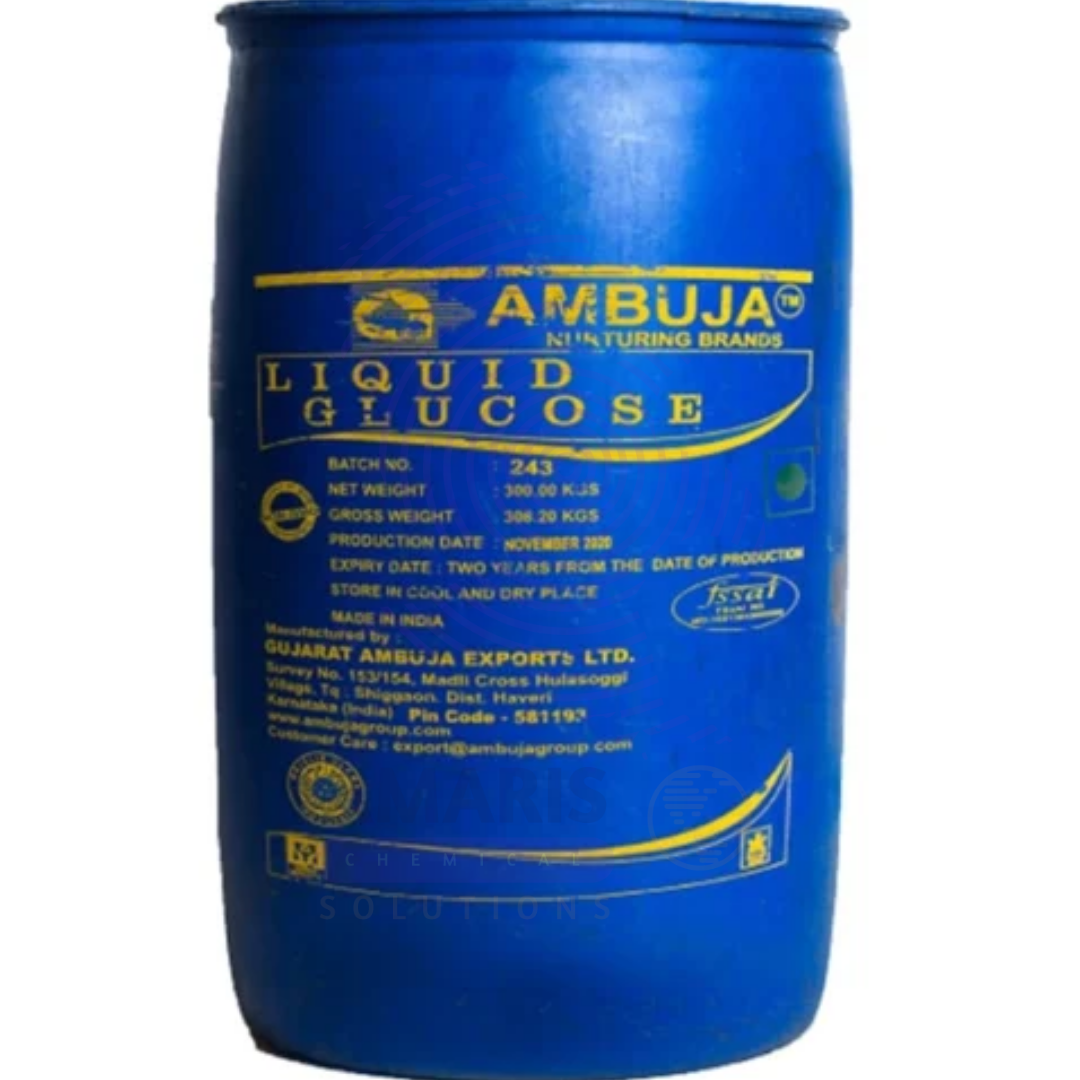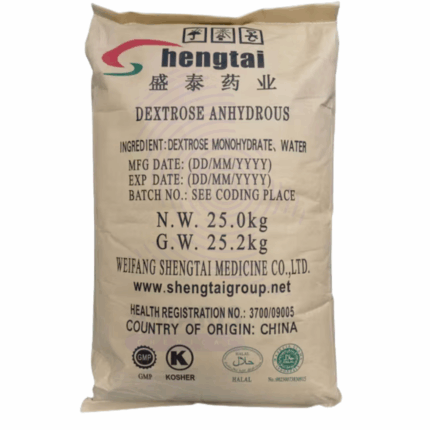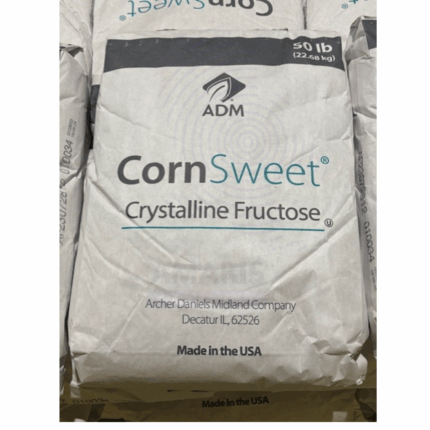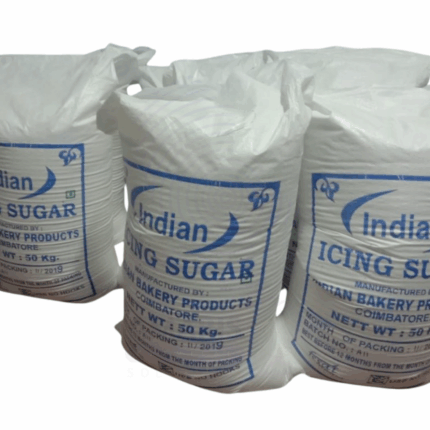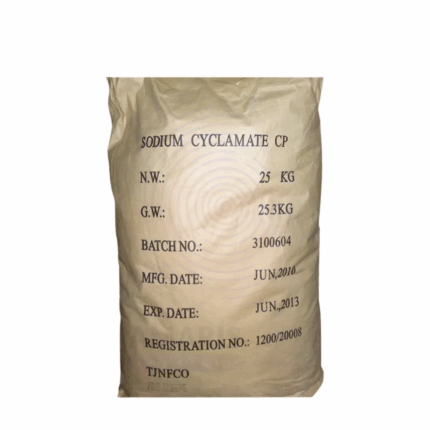“Disodium Phosphate” has been added to your cart. View cart
Liquid Glucose
$ 2.00 Original price was: $ 2.00.$ 1.16Current price is: $ 1.16.
Whatsapp Order
Liquid Glucose is a viscous, clear to pale amber syrup primarily composed of glucose and other saccharides. It is produced by the enzymatic hydrolysis of starch derived from corn, wheat, or potatoes. Known for its high sweetness and excellent moisture-retention properties, Liquid Glucose is widely used in the food and beverage industry to enhance texture, sweetness, and shelf life. It also acts as a humectant and crystallization inhibitor, improving the quality and consistency of various processed foods.
Description
Table of Contents
Toggle
Liquid Glucose
Primary Uses
- Food and Confectionery Industry
- Used as a sweetener in candies, chewing gums, and toffees, providing a smooth texture and preventing sugar crystallization.
- Acts as a humectant in baked goods, helping retain moisture and prolong freshness in products like cakes, cookies, and bread.
- Serves as a binding agent and viscosity enhancer in syrups, sauces, and dessert fillings.
- Beverage Industry
- Added to soft drinks, energy drinks, and fruit juices as a source of fermentable sugars and to improve mouthfeel and sweetness balance.
- Pharmaceuticals and Nutraceuticals
- Used as a carrier and sweetening agent in syrups, cough medicines, and vitamin formulations to improve palatability and texture.
- Cosmetics and Personal Care
- Incorporated as a humectant and skin-conditioning agent in lotions, creams, and hair care products to maintain moisture and improve spreadability.
Secondary Uses
- Industrial Applications
- Used in fermentation processes as a glucose source for microbial growth in biotechnology and pharmaceutical production.
- Animal Feed
- Occasionally added as an energy source and palatability enhancer in animal feed formulations.
- Food Packaging
- Utilized in edible coatings and films for fruits and vegetables to enhance shelf life and appearance.
PRODUCT KEY FEATURES
- Basic Identification Attributes
- Chemical Name (IUPAC): D-Glucose syrup
- Common/Trade Name: Liquid Glucose; Glucose Syrup; Starch Hydrolysate
- CAS Number: 9050-36-6
- HS Code: 1702.90.00
- Synonyms: Glucose syrup; Corn syrup; Dextrose syrup
- Physical & Chemical Properties
- Physical State: Viscous liquid (syrup)
- Color & Odor: Clear to pale amber; mild sweet odor
- pH: Typically 4.0 – 6.0
- Solubility: Miscible with water
- Sweetness: Approximately 70-80% relative to sucrose
- Viscosity: High, dependent on concentration and dextrose equivalent (DE)
- Safety & Hazard Attributes
- GHS Classification: Not hazardous under normal use
- Toxicity: Non-toxic; food-grade material
- Exposure Limits: Not applicable
- Storage & Handling Attributes
- Storage Conditions: Store in a cool, dry place away from direct sunlight and contamination
- Container Type: Food-grade plastic drums or stainless steel containers
- Shelf Life: Typically 12 to 24 months when stored properly
- Handling Precautions: Avoid contamination; maintain hygiene
- Regulatory & Compliance Attributes
- Approved as a food additive and ingredient by FDA, EFSA, and Codex Alimentarius
- Complies with food safety and purity standards for sweeteners and syrups
- Environmental & Health Impact
- Biodegradability: Readily biodegradable
- Ecotoxicity: Low environmental impact when released in small quantities
- Bioaccumulation: Not applicable
- Carcinogenicity/Mutagenicity: Not classified
SAFETY HANDLING PRECAUTIONS
- Safety Handling Precautions
- PPE Required: None generally required for food-grade handling
- Handling Guidelines: Maintain hygienic conditions; avoid microbial contamination
- Storage Measures: Keep sealed and protected from moisture and contaminants
- First Aid Measures
- Inhalation: Not applicable due to liquid state
- Skin Contact: Wash with water if sticky residue causes irritation (rare)
- Eye Contact: Rinse with water if contact occurs
- Ingestion: Safe for consumption in food quantities
- Firefighting Measures
- Fire Hazards: Non-flammable but may burn if exposed to high heat
- Extinguishing Media: Use water spray, foam, or dry chemical extinguishers
- Special Precautions: Avoid inhalation of smoke or vapors in fire conditions
Related products
Blueberry Toppings
Blueberry Toppings are sweet, fruit-based condiment preparations made primarily from blueberries, sugar, and thickening agents. They are characterized by a vibrant blue-purple color, fruity aroma, and a sweet-tart flavor profile. Typically semi-viscous with chunks or pureed pieces of blueberry, these toppings are used as finishing ingredients in desserts, breakfast foods, and beverages. Blueberry toppings may be prepared as preserves, syrups, or glazes and often contain natural flavors and preservatives to enhance shelf life and sensory appeal.
Dextrose Anhydrous BP Injectable
Dextrose Anhydrous BP Injectable is a sterile, highly purified crystalline form of glucose that serves as a critical energy source in intravenous therapy. It is widely used in parenteral nutrition, rehydration, and hypoglycemia management. The anhydrous form contains no water, allowing precise control of concentration in injectable solutions. Meeting British Pharmacopoeia (BP) standards, it ensures pharmaceutical-grade purity and sterility, suitable for direct injection or as a component in compounded IV fluids. It provides readily available carbohydrates metabolized to supply energy, regulate osmolarity, and maintain fluid-electrolyte balance in clinical care.
Fructose
Fructose, also known as fruit sugar, is a naturally occurring monosaccharide found in many plants, fruits, honey, and root vegetables. It is a simple sugar with a sweet taste and is one of the three dietary monosaccharides, alongside glucose and galactose. Fructose appears as a white crystalline powder, highly soluble in water, and is commonly used as a sweetener in food and beverage industries due to its high relative sweetness. It plays important roles in metabolism and is used extensively in the production of high-fructose corn syrup (HFCS) and other sweetening agents.
Icing Sugar Super refined
Icing Sugar Super refined, also known as powdered sugar or confectioners' sugar, is a finely ground white sugar produced by milling granulated sugar into a smooth, powdery form. This grade of icing sugar has an ultra-fine texture with a particle size typically less than 50 microns, ensuring quick solubility and a smooth finish. It often contains a small percentage of anti-caking agent such as cornstarch or tricalcium phosphate to prevent clumping. Super refined icing sugar is widely used in baking, confectionery, and food processing industries for its fast-dissolving and smooth blending characteristics.
Maltitol Powder
Maltitol Powder is a white, crystalline polyol (sugar alcohol) derived from hydrogenated maltose obtained from starch sources like corn or wheat. It is a low-calorie, high-sweetness sugar substitute with about 90% the sweetness of sucrose but significantly fewer calories (approximately 2.1 kcal/g vs. 4 kcal/g for sugar). It has excellent solubility, low hygroscopicity, and provides a clean, sweet taste without an aftertaste. Maltitol Powder is widely used in food, pharmaceutical, and nutraceutical applications for its sugar-like properties, making it suitable for diabetic, low-carb, and dental-friendly formulations.
Sodium Cyclamate 80 Mesh
Sodium Cyclamate 80 Mesh is a white, crystalline powder used as an artificial sweetener. It is approximately 30 to 50 times sweeter than sucrose (table sugar) and provides a low-calorie sugar substitute. Due to its high sweetness and stability under heat and acidic conditions, it is commonly used in food and beverage formulations, pharmaceuticals, and personal care products as a sugar alternative.
Stevia 25kg
Stevia 25kg refers to a bulk packaging format of high-purity stevia extract, a natural, zero-calorie sweetener derived from the leaves of Stevia rebaudiana. It contains steviol glycosides—primarily Rebaudioside A and Stevioside—which are responsible for its intense sweetness. Stevia is widely used as a sugar substitute in food and beverage formulations, offering a healthier alternative for calorie-conscious and diabetic consumers. This product is typically available in powder or granular form, suitable for large-scale commercial use.
Sugar Slurry
Sugar Slurry is a concentrated aqueous solution of sucrose, prepared by dissolving refined sugar in water to create a viscous, pumpable syrup. It is used extensively in food, beverage, and industrial applications where liquid sweeteners are preferred over granulated sugar for ease of mixing, consistency, and handling. Sugar slurry ensures uniform sweetness and rapid dissolution in various processes and formulations.


 Acidulants
Acidulants Antioxidants
Antioxidants Nutraceutical Ingredients (food)
Nutraceutical Ingredients (food)
 Collectors
Collectors Dust Suppressants
Dust Suppressants Explosives and Blasting Agents
Explosives and Blasting Agents Flocculants and Coagulants
Flocculants and Coagulants Frothers
Frothers Leaching Agents
Leaching Agents pH Modifiers
pH Modifiers Precious Metal Extraction Agents
Precious Metal Extraction Agents
 Antioxidants(plastic)
Antioxidants(plastic) Colorants (Pigments, Dyes)
Colorants (Pigments, Dyes) Fillers and Reinforcements
Fillers and Reinforcements Flame Retardants
Flame Retardants Monomers
Monomers Plasticizers
Plasticizers Polymerization Initiators
Polymerization Initiators Stabilizers (UV, Heat)
Stabilizers (UV, Heat)
 Antifoaming Agents
Antifoaming Agents Chelating Agents
Chelating Agents Coagulants and Flocculants
Coagulants and Flocculants Corrosion Inhibitors
Corrosion Inhibitors Disinfectants and Biocides
Disinfectants and Biocides Oxidizing Agents
Oxidizing Agents pH Adjusters
pH Adjusters Scale Inhibitors( water)
Scale Inhibitors( water)
 Antioxidants(cosmetic)
Antioxidants(cosmetic) Emollients
Emollients Fragrances and Essential Oils
Fragrances and Essential Oils Humectants
Humectants Preservatives
Preservatives Surfactants(cosmetic)
Surfactants(cosmetic) Thickeners
Thickeners UV Filters
UV Filters
 Fertilizers
Fertilizers Soil Conditioners
Soil Conditioners Plant Growth Regulators
Plant Growth Regulators Animal Feed Additives
Animal Feed Additives Biostimulants
Biostimulants Pesticides (Herbicides, Insecticides, Fungicides)
Pesticides (Herbicides, Insecticides, Fungicides)
 Active Pharmaceutical Ingredients (APIs)
Active Pharmaceutical Ingredients (APIs) Excipients
Excipients Solvents(pharmaceutical)
Solvents(pharmaceutical) Antibiotics
Antibiotics Antiseptics and Disinfectants
Antiseptics and Disinfectants Vaccine Adjuvants
Vaccine Adjuvants Nutraceutical Ingredients (pharmaceutical)
Nutraceutical Ingredients (pharmaceutical) Analgesics & Antipyretics
Analgesics & Antipyretics
 Analytical Reagents
Analytical Reagents Chromatography Chemicals
Chromatography Chemicals Spectroscopy Reagents
Spectroscopy Reagents Molecular Biology Reagents
Molecular Biology Reagents Biochemical Reagents
Biochemical Reagents Inorganic and Organic Standards
Inorganic and Organic Standards Laboratory Safety Chemicals
Laboratory Safety Chemicals Specialty Laboratory Chemicals(Special Laboratory Equipment)
Specialty Laboratory Chemicals(Special Laboratory Equipment)
 Demulsifiers
Demulsifiers Hydraulic Fracturing Fluids
Hydraulic Fracturing Fluids Scale Inhibitors(oil)
Scale Inhibitors(oil) Surfactants(oil)
Surfactants(oil) Drilling Fluids
Drilling Fluids
 Dyes and Pigments
Dyes and Pigments Bleaching Agents
Bleaching Agents Softening Agents
Softening Agents Finishing Agents
Finishing Agents Antistatic Agents
Antistatic Agents
 Admixtures
Admixtures Waterproofing Agents
Waterproofing Agents Sealants and Adhesives
Sealants and Adhesives Curing Compounds
Curing Compounds Concrete Repair Chemicals
Concrete Repair Chemicals Anti-Corrosion Coatings
Anti-Corrosion Coatings
 Surfactants(cleaning)
Surfactants(cleaning) Builders
Builders Enzymes
Enzymes Solvents (Cleaning)
Solvents (Cleaning) Fragrances
Fragrances
 Electronic Chemicals
Electronic Chemicals Catalysts
Catalysts Lubricants
Lubricants Photographic Chemicals
Photographic Chemicals Refrigerants
Refrigerants Automotive chemicals
Automotive chemicals Pyrotechnic Chemicals
Pyrotechnic Chemicals
 Biodegradable Surfactants
Biodegradable Surfactants Bio-based Solvents
Bio-based Solvents Renewable Polymers
Renewable Polymers Carbon Capture Chemicals
Carbon Capture Chemicals Wastewater Treatment Chemicals
Wastewater Treatment Chemicals
 Pigments
Pigments Solvents(paint)
Solvents(paint) Specialty Coatings
Specialty Coatings Binders/Resins
Binders/Resins Additives
Additives Driers
Driers Anti-Corrosion Agents
Anti-Corrosion Agents Functional Coatings
Functional Coatings Application-Specific Coatings
Application-Specific Coatings
 Fresh Herbs
Fresh Herbs Ground Spices
Ground Spices Whole Spices
Whole Spices Spice Blends
Spice Blends Dried Herbs
Dried Herbs
 Leavening Agents
Leavening Agents Dough Conditioners
Dough Conditioners Flour Treatments
Flour Treatments Fat Replacers
Fat Replacers Decoratives
Decoratives Preservatives(baking)
Preservatives(baking)
 Plasticizers & Softeners
Plasticizers & Softeners Reinforcing Agents
Reinforcing Agents Adhesion Promoters
Adhesion Promoters Vulcanizing Agents
Vulcanizing Agents Antidegradants
Antidegradants Blowing Agents
Blowing Agents Fillers & Extenders
Fillers & Extenders Accelerators & Retarders
Accelerators & Retarders